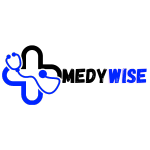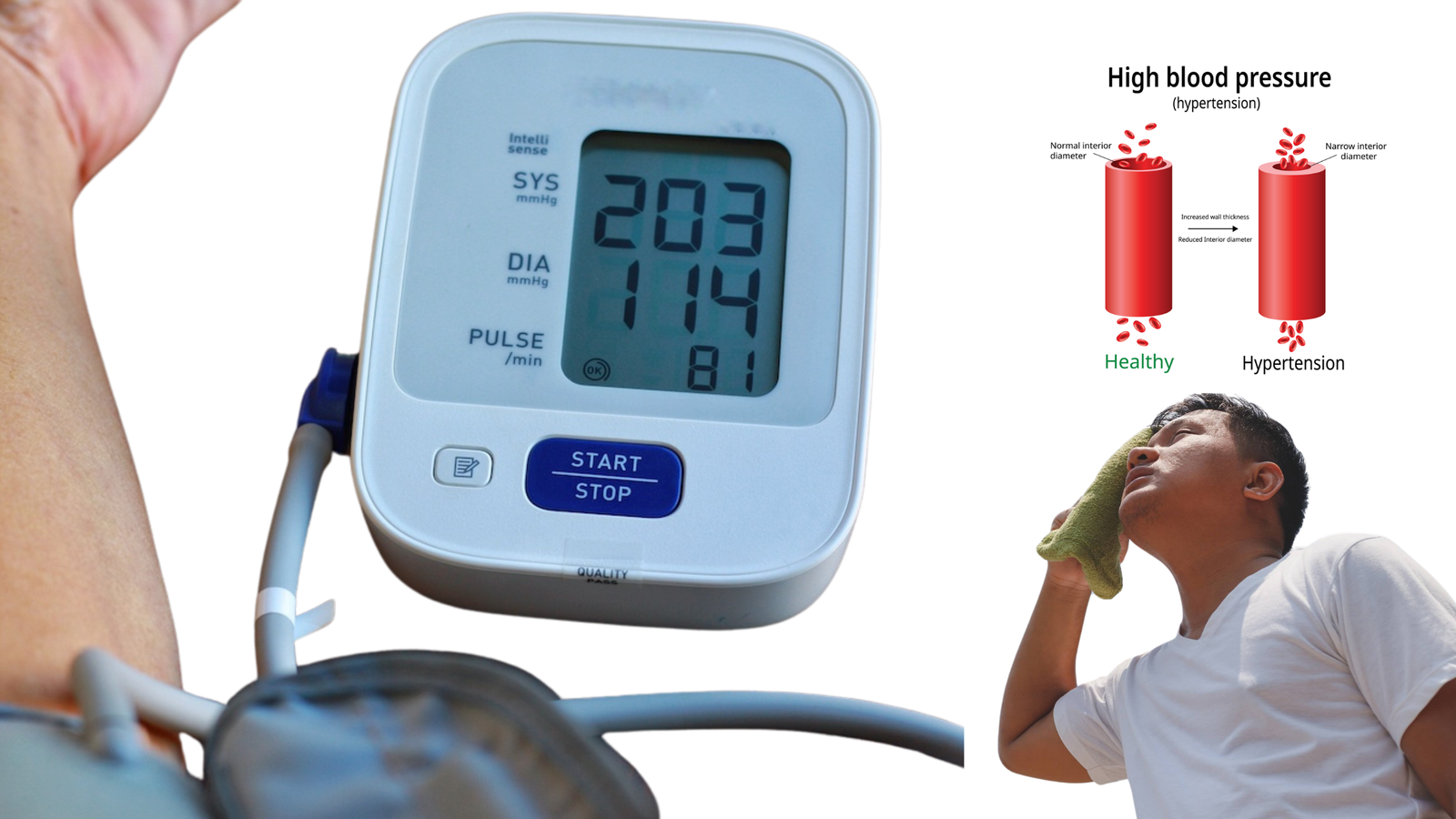Introduction
To understand Does dehydration cause high blood pressure? it’s crucial to start by understanding how our body regulates blood pressure. One key player is our blood volume, the amount of blood circulating in our veins and arteries, directly influencing blood pressure. When the body is well-hydrated, the blood volume remains normal, ensuring that blood pressure is maintained within a healthy range.
Does Dehydration Cause High Blood Pressure?
Dehydration can lead to a decrease in blood volume. This decrease in blood volume causes the blood vessels to constrict to maintain sufficient blood flow to organs and tissues. As a result of this constriction, blood pressure can temporarily increase. Thus, the question “Does dehydration cause high blood pressure?” finds its answer in this physiological reaction. It’s a compensatory mechanism that helps to stabilize blood pressure in the short term. However, prolonged dehydration can strain the heart as it works harder to pump a smaller volume of blood throughout the body, potentially leading to sustained high blood pressure if not addressed.
Understanding the Effects of Dehydration on Blood Pressure
To further delve into the question, “Does dehydration cause high blood pressure?” it’s important to consider the role of the kidneys. These organs help regulate blood pressure by controlling the fluid balance in the body. When dehydrated, the kidneys release hormones that cause the body to retain sodium and water, increasing blood volume and thus, blood pressure. This is another pathway through which dehydration might lead to an increase in blood pressure.
Managing Hydration to Control Blood Pressure
So, does dehydration cause high blood pressure? Yes, dehydration can influence blood pressure, and managing hydration is a vital part of controlling blood pressure levels. Drinking sufficient water and consuming fluids regularly throughout the day can help maintain proper hydration and prevent the onset of dehydration-induced high blood pressure. Individuals, especially those with a history of blood pressure issues, should monitor their hydration levels and consult healthcare providers to understand the optimal fluid intake for their health conditions.
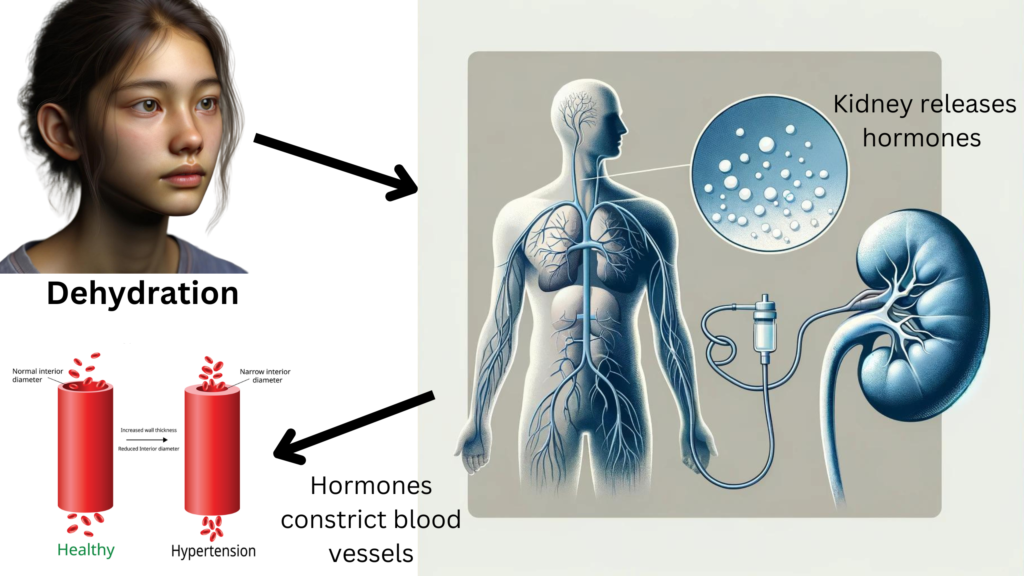
Preventing Dehydration to Maintain Healthy Blood Pressure
In conclusion, addressing the query “Does dehydration cause high blood pressure?” requires a proactive approach to hydration. Regular intake of fluids not only supports overall health but is also critical in maintaining healthy blood pressure levels. For those particularly concerned about blood pressure, it’s advisable to avoid situations that lead to rapid dehydration, such as excessive physical activity in hot weather without adequate fluid replacement.
By understanding the intricate relationships and mechanisms, such as how dehydration impacts blood volume and kidney function, individuals can better manage their blood pressure. Regular check-ups and maintaining a lifestyle that includes adequate hydration are essential steps toward preventing dehydration-related high blood pressure.
Does Dehydration Cause High Blood Pressure and Heart Rate?
Yes, dehydration can indeed cause both high blood pressure and an increased heart rate. When the body lacks sufficient fluids, it activates the sympathetic nervous system. This activation triggers the release of stress hormones such as adrenaline, which not only increases heart rate but also causes blood vessels to constrict. This dual response leads to elevated blood pressure.
Sympathetic Nervous System Activation
The body’s response to dehydration involves several compensatory mechanisms:
- Heart Rate Increase: To compensate for a lower blood volume due to dehydration, the heart beats faster to ensure that blood reaches all parts of the body efficiently. This is a direct response to maintaining adequate blood flow and oxygen delivery to tissues.
- Blood Vessel Constriction: The stress hormones released during dehydration, such as adrenaline, cause the blood vessels to narrow. This constriction increases vascular resistance, which in turn elevates blood pressure.
Dehydration and the Elderly: A High-Risk Group
Elderly individuals face a higher risk of experiencing the adverse effects of dehydration on blood pressure:
- Decreased Thirst Sensation: As people age, their sense of thirst becomes less acute, making them less likely to drink enough fluids, which increases the risk of dehydration.
- Medication Side Effects: Many medications prescribed for older adults can increase the risk of dehydration by enhancing fluid loss or decreasing thirst.
- Chronic Conditions: Health issues like diabetes and kidney disease are more common in the elderly and can worsen the effects of dehydration.
Why Does Drinking Water Increase Blood Pressure?
While dehydration is linked to high blood pressure, consuming water affects blood pressure too, usually in a beneficial manner:
- Short-Term Increase: Drinking a large volume of water quickly can cause a temporary rise in blood pressure. This is because the sudden increase in blood volume raises the pressure within blood vessels.
- Long-Term Benefits: Consistent hydration is crucial for maintaining blood volume and proper circulation. It also supports kidney function, which plays a vital role in regulating blood pressure through the management of electrolytes and waste elimination.
Does Dehydration Cause High Heart Rate?
Dehydration significantly influences heart rate:
- Compensatory Mechanism: The heart’s increased rate during dehydration is a compensatory mechanism aimed at maintaining blood pressure and ensuring adequate blood flow, especially when blood volume is low.
- Stress Hormone Release: The body’s response to dehydration includes the release of stress hormones that stimulate the heart to beat faster and work harder, raising the resting heart rate.
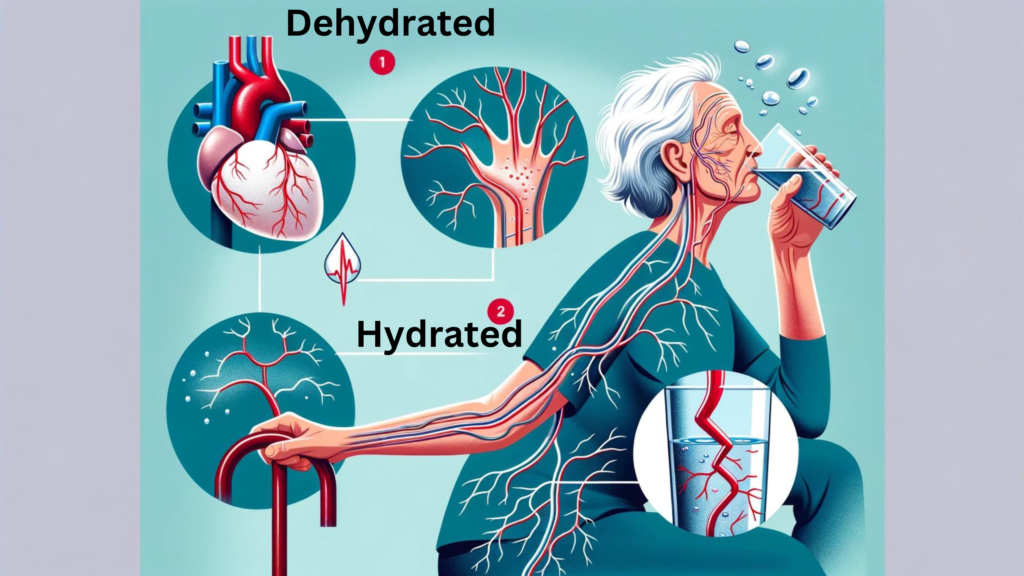
8 Shocking Facts About Dehydration and Blood Pressure
These eight shocking facts to conclude “Does dehydration cause high blood pressure?” emphasize the critical and often overlooked relationship between hydration and cardiovascular health:
Dehydration Can Mask as Other Health Issues
Dehydration symptoms, including fatigue, headache, and dizziness, often resemble those of other health problems. This similarity can lead to misdiagnoses, where the actual issue—dehydration—remains unaddressed, potentially exacerbating the effects on blood pressure.
Chronic Dehydration Can Lead to Persistent High Blood Pressure
Failing to consume sufficient water consistently can cause chronic dehydration. This condition can persistently elevate blood pressure, placing ongoing stress on the cardiovascular system and potentially leading to severe long-term health issues.
Mild Dehydration Can Be Detrimental
Even a slight loss of fluids—just 1-2% of body weight—can disrupt normal blood pressure regulation. This mild dehydration can easily result from daily activities, underscoring the importance of regular water intake.
Dehydration Impacts Cognitive Function and Mood
Beyond physical health, dehydration negatively affects cognitive function and mood. These impacts can make it more difficult to manage conditions like high blood pressure, as they contribute to feelings of lethargy, irritability, and lack of focus.
Dehydration Can Exacerbate Existing Health Conditions
For those with preexisting conditions such as hypertension or cardiovascular disease, dehydration can worsen symptoms and complicate the management of these conditions, posing additional health risks.
Elderly Individuals Are at Higher Risk
The elderly are particularly vulnerable to the adverse effects of dehydration on blood pressure, due to reduced thirst sensation and the effects of medications which may increase dehydration risk.
Hydration Needs Vary by Individual
Various factors influence individual hydration needs, including age, activity level, climate, and health status. Recognizing and responding to personal hydration requirements is vital for maintaining optimal blood pressure and overall health.
Proper Hydration Can Improve Blood Pressure Control
Regular and adequate hydration is a straightforward, yet effective method for controlling blood pressure. Sufficient water intake supports cardiovascular health and aids in preventing the negative consequences associated with dehydration.
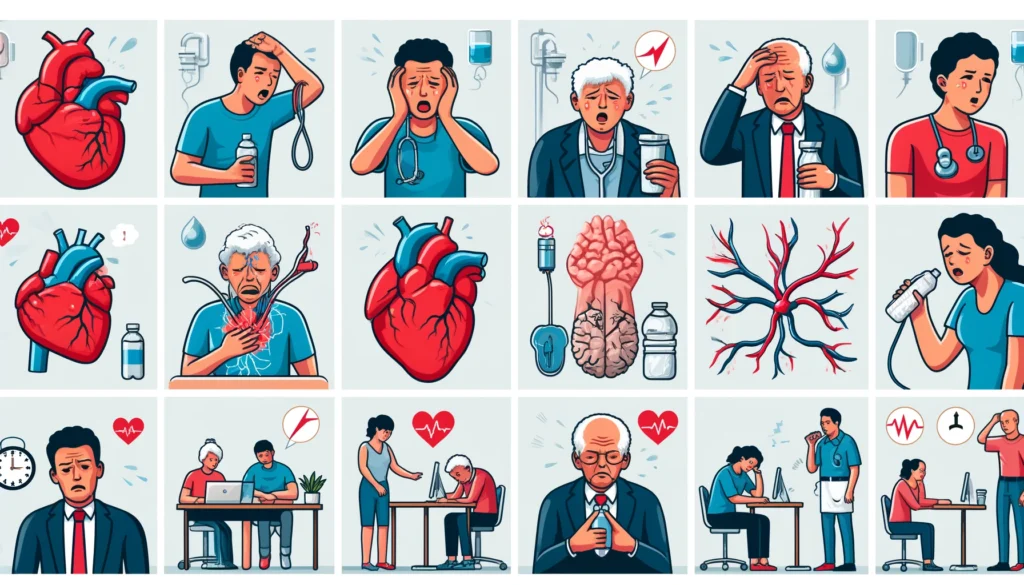
Conclusion
Dehydration significantly impacts cardiovascular health by potentially raising blood pressure, leading to the question, “Does Dehydration Cause High Blood Pressure?” The relationship between dehydration and increased blood pressure is well-documented, emphasizing the importance of staying adequately hydrated. When the body lacks sufficient fluids, the blood becomes more concentrated, which decreases blood volume and increases blood viscosity. This condition forces the heart to work harder to pump blood through the vessels, which can lead to elevated blood pressure. This mechanism directly ties into the concern of whether dehydration contributes to high blood pressure.
To mitigate this risk, it is crucial to maintain a consistent intake of fluids throughout the day, not merely to quench thirst but to ensure the body’s systems, including the cardiovascular system, function optimally. Addressing the question “Does Dehydration Cause High Blood Pressure?” requires understanding that regular hydration is a key preventative measure against the rise in blood pressure that dehydration can cause. By proactively managing hydration levels, individuals can support their heart health and prevent the complexities associated with hypertension, reaffirming the critical role of hydration in maintaining cardiovascular stability and overall health.
FAQs About Dehydration and Blood Pressure
Q. Does Dehydration Cause High Blood Pressure?
A: The relationship between dehydration and blood pressure can manifest as either high or low blood pressure, depending on the severity and duration of the dehydration. Mild to moderate dehydration typically leads to high blood pressure because of vasoconstriction—the narrowing of blood vessels—as the body attempts to manage blood flow. In contrast, severe dehydration may result in low blood pressure due to a substantial decrease in blood volume, where the reduced fluid levels are insufficient to maintain normal blood pressure.
Q. How Does Dehydration Cause High Blood Pressure and Pulse?
A: Dehydration and blood pressure are closely linked through the mechanism of blood volume reduction. When the body is dehydrated, there is less fluid available in the bloodstream, leading to decreased blood volume. To compensate, the body constricts blood vessels, which can cause blood pressure to rise. At the same time, dehydration causes the heart to beat faster (increased pulse rate) to ensure efficient circulation of the reduced blood volume, striving to maintain oxygen and nutrient delivery to cells.
Q. Does Dehydration Cause High Blood Pressure and Increase Heart Rate?
A: Indeed, dehydration can trigger both high blood pressure and an increased heart rate. This dual response is the body’s way of coping with reduced blood volume. An increased heart rate helps to pump the limited volume of blood more quickly to sustain circulation and oxygenation of tissues. Concurrently, the narrowing of blood vessels caused by hormonal responses to dehydration elevates blood pressure, an effect that helps to counterbalance the lower blood volume.
Q. Can Dehydration Cause Low Blood Pressure?
A: While dehydration is often associated with high blood pressure, it can indeed lead to low blood pressure, particularly in severe cases. Significant fluid loss leads to a dramatic reduction in blood volume, making it challenging for the heart to maintain adequate blood pressure levels. This scenario results in hypotension, where blood flow to vital organs can become critically low, posing serious health risks.
Q. Does Dehydration Cause High Blood Pressure in the Elderly?
A: Elderly individuals face a higher risk of both dehydration and its impact on blood pressure. Age-related changes such as a diminished thirst response and decreased kidney efficiency make it harder for older adults to retain fluid and sense dehydration. Additionally, many older adults take medications that can exacerbate dehydration, further complicating blood pressure control. Therefore, understanding and managing hydration in the elderly is crucial for preventing spikes in blood pressure and safeguarding overall health.
